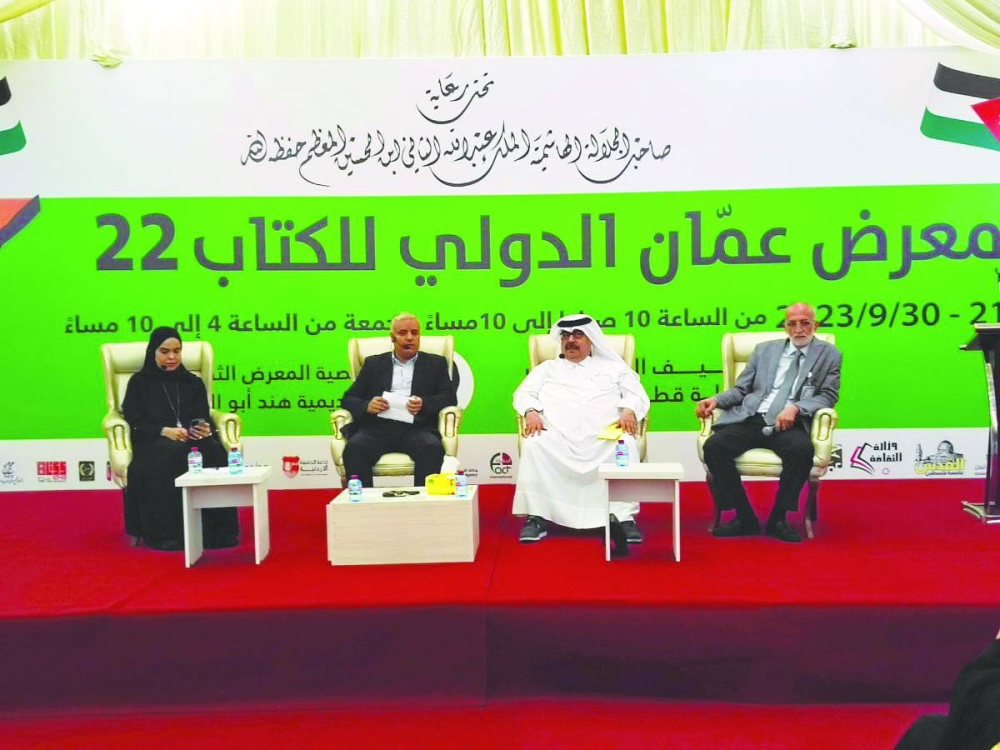A symposium on the publishing industry in Qatar was held within the Qatar cultural programme accompanying the Amman International Book Fair (AIBF) 2023.
Speakers at the symposium included Vice-President of the Arab Publishers Association Ibrahim Abdulrahim al-Sayed, General-Manager of Director-General of the Qatari Forum for Authors and CEO of Rosa Publishing House Dr Aisha Jassim al-Kuwari, and President of the Union of Jordanian Publishers Jabr Muhamed Abu Fares.
Jordanian novelist Ahmed Tarawneh, who moderated the symposium, shed light on the overall Arab cultural scene and Qatar's valuable contributions to its enrichment.
He pointed to the interrelation between culture and economy explaining that the cultural industries, including publishing, are a key pillar to every country's economy.
The international publishing market in 2022 was worth $138bn, Tarawneh said pointing that the Arab countries' share in that was only $5bn; mostly limited to publishing university and school books, which indicates that the publishing industry in the Arab world is going through a dangerous stage.
He stressed that Qatar is an integral part of the Arab cultural scene and the publishing sector, which requires studying the reality of publishing in the State and revealing its strengths and weaknesses.
Dr Aisha al-Kuwari pointed to the close connection between the publishing industry and the economy, where the publishing industry is considered a knowledge economy and faces great challenges, indicating that publishers shoulder their social responsibility in addition to the required investment ambition.
She added that the reality of the publishing sector in Qatar is not very different from the Arab countries in terms of problems, challenges, and economic crises affecting the sector, such as the rise in paper prices, the decline in book purchase rates, and the spread of the culture of reading. The solution to these obstacles lies in the "difficult reconciliation" between the dilemmas of the publishing sector and its high costs with the weak ability to acquire books, which requires playing major roles on the part of the publisher, the reader, and society as a whole.
She said that the number of publishing houses in Qatar is very small when compared with the great vision and ambition of the State. The publishing sector in Qatar began recently in 2017 with private publishing houses, and before that date the publishing sector in the country was a governmental institutional sector such as distribution institutions and libraries, she added explaining that Rosa Publishing House was the first publisher in Qatar, followed by Dar Al Watad, then Dar Nabja. Afterwards many publishing houses, private or semi-governmental, such as Qatar University Press, Hamad Bin Khalifa University Press, and publishing houses affiliated with research and study centers were opened she said.
Dr Aisha al-Kuwari explained that Qatar today is witnessing a diversity of publishing houses, which is a positive sign.
Wrapping up, she said that the AIBF 2023 provided the opportunity to showcase the publishing sector in Qatar, and to build bridges of co-operation between authors and publishers from Qatar and Jordan.
For his part, Dr a-Sayyed spoke about the history and emergence of the publishing industry in Qatar, indicating that the State is one of the first countries in the Arab world with the beginning of the era of the founder, Sheikh Jassim bin Mohamed al-Thani, to show interest in books, which were printed in the country and also purchased from India, Egypt and Baghdad. He also talked about the establishment of the Qatar Public Library in 1958 to be the first official library in the Gulf Co-operation Council countries.
Ibrahim Al Sayed elaborated on the history of the Qatari publishing industry, mentioning that Qatar was one of the first countries to join the International Standard Book Number (ISBN) in the early 1980s.
He added that the process of publishing continued through government institutions, such as the former ministries of information and culture, through the National Council for Culture and existing bodies, until 2017, which witnessed the beginning of private publishing.
He pointed to several projects that will contribute in the future to increasing the Qatari cultural and knowledge level, such as the "Qatar Reads" programme, which is a cultural program that is concerned with reading, writing and publishing, in addition to the presence of the Qatar National Library, one of the most important public libraries in the Arab region.
He also mentioned several awards related to cultural affairs, such as the Hamad Bin Khalifa Translation Award, one of the most important Arab awards in this field, in addition to the Novel Award, which stems from the Katara Novel Award.
He stated that the Doha International Book Fair which was launched in 1972 is one of the leading Arab book fairs as it ranks fourth in the Arab world, after the Beirut, Cairo and Baghdad. (QNA)

